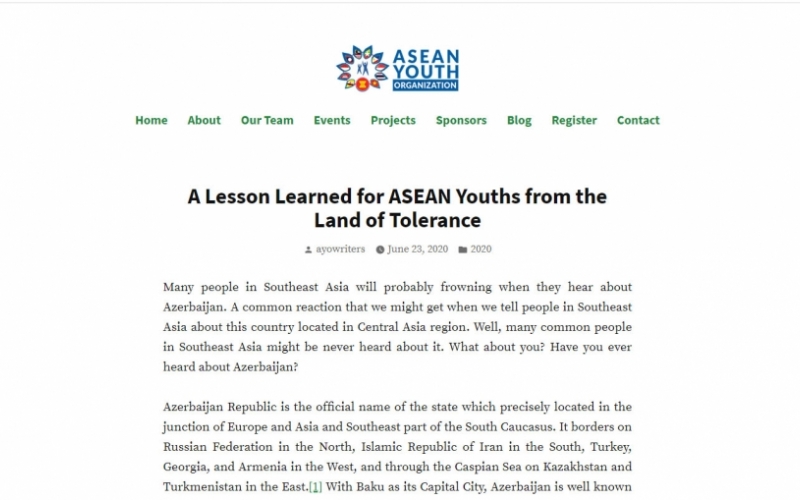
The Indonesia-based internet portal of the Youth Organization of the Association of Southeast Asian Nations (ASEAN) has published an article headlined "A Lesson Learned for ASEAN Youths from the Land of Tolerance" highlighting Azerbaijan's tolerant environment.
Written by Head of Project Development of ASEAN Youth Organization Handy Santoso, the article reads: " Many people in Southeast Asia will probably frowning when they hear about Azerbaijan. A common reaction that we might get when we tell people in Southeast Asia about this country located in Central Asia region. Well, many common people in Southeast Asia might be never heard about it. What about you? Have you ever heard about Azerbaijan?
Azerbaijan Republic is the official name of the state which precisely located in the junction of Europe and Asia and Southeast part of the South Caucasus. It borders on Russian Federation in the North, Islamic Republic of Iran in the South, Turkey, Georgia, and Armenia in the West, and through the Caspian Sea on Kazakhstan and Turkmenistan in the East. With Baku as its Capital City, Azerbaijan is well known as oil and gas producing country with the beauty of nature, architectural beauty as the result of cultural mixture between Asia and Europe, ancient culture with long time history, and tourist destination spots that will spoil the eyes of every visitor to come to the country. Let’s say one of the most prominent tourist destination spots in Baku, the Old City which is the center of civilization of Azerbaijan. It is also the proof of some old civilizations such as Zoroastrianism, Sasanian, Arabian, Persian, Shirvan, Ottoman, and Russian. The Old City of Baku is also one of tourist destination spots which recognized by UNESCO as the World Heritage Site, where tourists are able to enjoy the beauty of culture with a medieval feel. What a perfect mix of culture!
Azerbaijan is the perfect mixture, between East and West. It is a secular country, which means that they divide religious and political affairs within the systems. Azerbaijan is diverse in terms of religions and ethnicities. From the total number of Azerbaijan population of 10.136.769 people (data updated per June 22nd, 2020), it has some ethnic groups which consist of Azerbaijani (92% of the population), Lezgin (2% of the population), Russian (1% of the population), Talyshi (1% of the population), and other ethnic groups (2% of the population). Among those ethnicities, majority of the people are Turks and Muslim. However, being a Muslim-majority country has not prevented Azerbaijan from becoming a home to Christians, Jews, and other religious confessions. Throughout long history, many people with different religions and ethnicities have lived together in peace and harmony. Until today, the history has not recorded a single conflict between the three main groups of believers. That is the reason why the country can proudly be called the Land of Tolerance.
So, the question is what lesson can be learned by ASEAN youths from Azerbaijan? ASEAN as highly integrated region with the total population of 668.491.448 people (data updated per June 23rd, 2020), is a home to Muslim, Christian, Buddhist, Hindu, Confucianism, and many other traditional beliefs. However, undeniably, religious conflicts, terrorisms, and extremisms, and so forth remain unsolved in the region. Although the ASEAN Member States have tried their best to improve the condition through ASEAN Socio-Cultural Community framework, the unsolved problems are still here among us. So what we can do as young generations of ASEAN? Are we just going to remain silent, sit down, and watch the conflicts happening around us through TV or the internet? Well, I guess that is not a wise choice to take. Smart people will take the choice to learn from the mistakes or success stories of others.
As mentioned before about Azerbaijan, which is known as the Land of Tolerance, there are some reasons why as young generations of ASEAN, we should learn from Azerbaijan. First, Azerbaijani people have developed a mentality and mindset of kindness towards all people who live within its territory despite nationality, culture, and religion. This sounds pretty simple, but needs self-awareness, daily practices, and mature mentality to do it in real life. Second, Azerbaijan can serve as best example of a community where each person shows respect to all human-beings of different ethnicities and religions. They even share to join activities and participate in charitable work in the country. Third, we can learn from how they usually conduct interfaith dialogue and religious tolerance in order to facilitate the exchange of information and the share of mutual understanding among religious believers. So, as young generations of ASEAN we have to learn from each other and build better mutual understanding in the midst of our diversity.
Forth, we can learn about how state leaders in Azerbaijan created right, well-considered state policies which promote and support multiculturalism and tolerance. Their state policies make various religious communities in Azerbaijan feel the care of the state in preservation, reconstruction of churches, mosques, synagogues, and even settlements. This is one of the most important things for us to learn, because strong traditions of tolerance and mutual respect among different ethnic and religious communities are began with tireless efforts by state leaders to facilitate policies which foster and strengthen ties of diversity within the community. So, as the leaders of tomorrow of ASEAN, we have to consider this seriously to learn from Azerbaijani government so we can provide improvements and solve socio-cultural problems in ASEAN through facilitative policies. Last but not least, we have to keep believing that we can improve the situation of ASEAN in our hands, in near future. Thanks Azerbaijan for the great examples!"
The author concludes the article quoting the words by Azerbaijani national leader Heydar Aliyev: "A country becomes more powerful when it unites more nations, because every single one of them contributes universal culture and civilization” .
Views: 291
